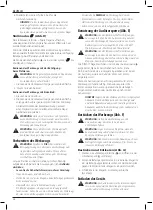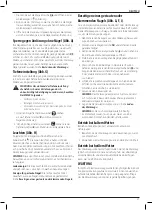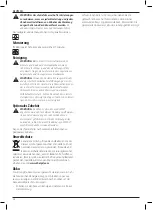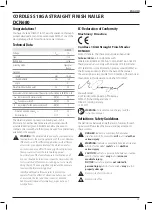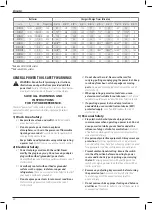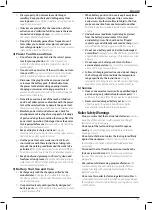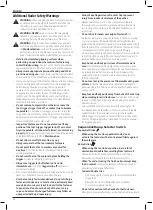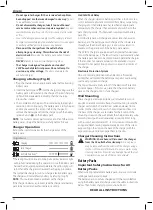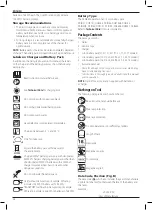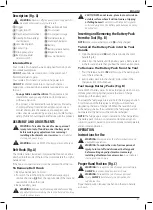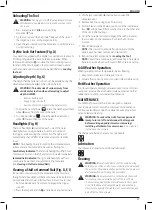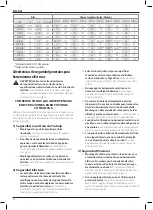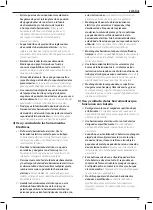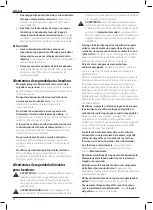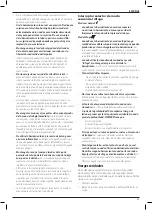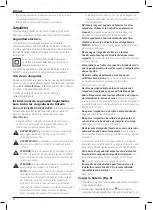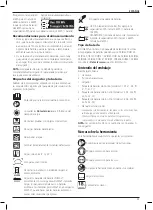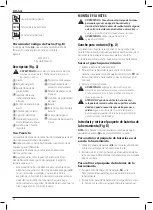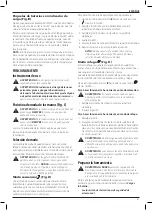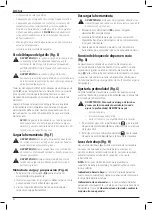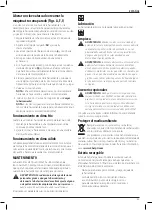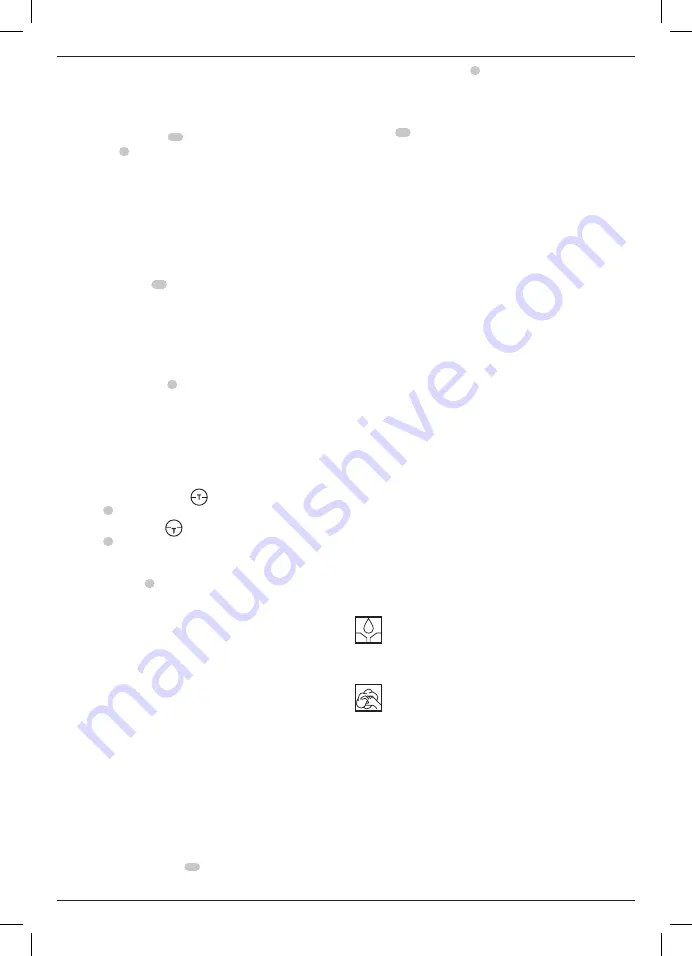
39
EngLIsh
Unloading The Tool
WARNING:
The trigger lock-off should always be locked
off whenever any adjustments are made or when tool is
not in use.
1. Press magazine latch
16
and open sliding
magazine
7
fully.
2. Tip the tool up until the nails slide freely out of the side of
the magazine. Close sliding magazine fully.
3. Open the jam clear door on the nosepiece to verify there are
no nails remaining.
Dryfire Lock Out Feature (Fig. A)
Your nailer is equipped with a dryfire lock out feature to prevent
it from cycling when there are no fasteners loaded. When
the low nail indicator
17
is visible, the tool is running low on
fasteners. When this happens, the tool will be locked out and
will not actuate until more nails are loaded. (Refer to
Loading
the Tool
.)
Adjusting Depth (Fig. G)
The depth that the fastener is driven can be adjusted using the
depth adjustment wheel
3
on the side of the tool.
WARNING: To reduce risk of serious injury from
accidental actuation when attempting to adjust
depth,
ALWAYS:
• Remove battery pack.
• Engage trigger lock-off.
• Avoid contact with trigger during adjustments.
1. To drive the nail shallower
, rotate the depth adjustment
wheel
3
away from the nose of the nailer.
2. To sink a nail deeper
, rotate the depth adjustment
wheel
3
toward the nose of the nailer.
Headlights (Fig. H)
There is a headlight
4
located on each side of the nailer.
Headlights turn on upon battery insertion, activation of
the trigger, or depressing the contact trip. The lights will
automatically shut off after 20 seconds unless tool remains
in use.
nOTE:
These headlights are for lighting the immediate work
surface and are not intended to be used as flashlights.
Low battery indicator:
The left-side headlight will flash four
consecutive times and then shut down to indicate low battery.
Jammed nail indicator:
The right-side headlight will flash
continually if a nail becomes jammed in the nosepiece
(see
Clearing a Stall or Jammed Nail)
.
Clearing a Stall or Jammed Nail (Fig. A, F, I)
If a nail becomes jammed in the nosepiece or the tool stalls,
the right-hand headlight will blink continuously. Keep the tool
pointed away from you and follow these instructions to clear:
1. Remove battery pack from tool and engage the trigger
lock-off.
2. Press the magazine latch
16
and remove any loaded nails.
3. Lift the jam clear latch
5
then pull up to open the
nosepiece door.
4. Remove bent nail, using pliers if necessary.
5. If driver blade is in the down position, cycle the stall release
lever
12
using enough force to fully slide it to the other end
of the slot in the housings.
6. Close the nosepiece door and engage the latch pin under
the two arms on the nosepiece. Push latch until it locks
in place.
7. Reinsert battery pack.
nOTE:
The tool will disable itself and not reset until the
battery pack has been removed and reinserted.
8. Reinsert nails into magazine (see
Loading the Tool
).
nOTE:
Should nails continue to jam frequently in nosepiece,
have tool serviced by an authorised
D
e
WALT
service centre.
Cold Weather Operation
When operating tools at temperatures below freezing:
1. Keep tool as warm as possible prior to use.
2. Actuate the tool 5 or 6 times into scrap timber before using.
Hot Weather Operation
Tool should operate normally. However, keep tool out of direct
sunlight as excessive heat can deteriorate bumpers and other
rubber parts resulting in increased maintenance.
MAINTENANCE
Your
D
e
WALT
power tool has been designed to operate
over a long period of time with a minimum of maintenance.
Continuous satisfactory operation depends upon proper tool
care and regular cleaning.
WARNING: To reduce the risk of serious personal
injury, turn tool off and disconnect battery pack
before making any adjustments or removing/
installing attachments or accessories.
An accidental
start-up can cause injury.
The charger and battery pack are not serviceable.
Lubrication
Your power tool requires no additional lubrication.
Cleaning
WARNING:
Blow dirt and dust out of the main housing
with dry air as often as dirt is seen collecting in and around
the air vents. Wear approved eye protection and approved
dust mask when performing this procedure.
WARNING:
Never use solvents or other harsh chemicals
for cleaning the non-metallic parts of the tool. These
chemicals may weaken the materials used in these parts.
Use a cloth dampened only with water and mild soap.
Never let any liquid get inside the tool; never immerse any
part of the tool into a liquid.


